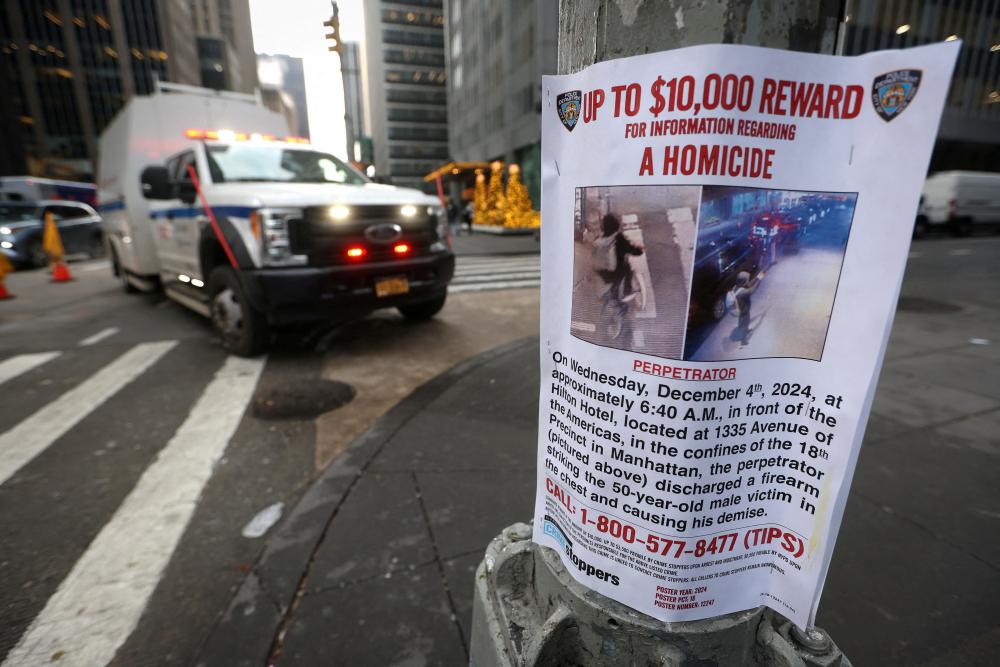The FBI has announced a $50,000 reward aimed at capturing the gunman responsible for the fatal shooting of Brian Thompson, the chief executive of UnitedHealthcare, in New York City. This effort is a part of an ongoing investigation into the incident, which police have characterized as a “targeted” attack. The shooting occurred in Manhattan early on Wednesday morning, prompting swift action from law enforcement, who are collaborating with the FBI to ascertain the suspect’s movements before and after the crime. Adding further incentive for information, local police have also offered a $10,000 reward, indicating the seriousness and urgency of the situation. Investigators are currently sifting through surveillance footage that depicts the shooter fleeing the scene on a bicycle before concealing himself in Central Park, where evidence suggests that he later abandoned a backpack while escaping.
The search for the gunman has taken a broader scope, with authorities expressing concern that the suspect may have already left New York City, potentially utilizing interstate bus services. Jessica Tisch, the New York Police Department commissioner, indicated that the police have gathered enough evidence to believe the gunman may no longer be within city limits. Despite these developments, New York City Mayor Eric Adams remains optimistic about the police’s efforts to track down the suspect, suggesting that investigators are making progress. The investigation has been augmented by the use of drones to effectively comb through Central Park, resulting in the discovery of a backpack believed to be connected to the assailant.
Another critical aspect of the ongoing investigation involves scrutinizing images captured by surveillance cameras, which reveal the suspect wearing a mask or hood at the time of the shooting. One specific image taken from a hostel on Manhattan’s Upper West Side shows a person believed to be the suspect lowering their face covering while speaking to a receptionist. However, despite these leads, the identity of the perpetrator remains unknown. Investigators are working tirelessly to establish a motive, but early indicators suggest that the attack may be tied to the broader issues surrounding the healthcare industry. Phrases found inscribed on the shell casings—specifically “delay,” “deny,” and potentially “depose”—have raised alarm about a possible relation to the industry’s notorious practices of denying claims for medical services.
The larger implications of Thompson’s death resonate within the healthcare sector, which has been under scrutiny for becoming increasingly profit-driven. Healthcare debt is the primary cause of bankruptcy in America, and corporations like UnitedHealthcare are among the wealthiest entities operating within the system. Thompson, whose salary as CEO was reportedly about $10 million, became a symbol of the healthcare industry that many Americans blame for financial hardships due to their insurance practices. The shocking nature of the shooting has sent ripples through the insurance landscape, prompting immediate changes in security protocols. UnitedHealthcare has indicated a commitment to enhancing the security measures for its staff to ensure their safety amid the evolving crisis.
In light of the tragedy, other companies in the insurance sector are also taking proactive measures to safeguard their employees and business operations. For instance, Centene Corp has adapted its upcoming investor day to a virtual format, providing a cautionary response to the precarious situation following the shooting. Meanwhile, Medica, a Minnesota-based non-profit health insurance company, has taken the additional step of temporarily closing its offices, mandating that about 3,000 employees work remotely. The precautionary actions are framed as responses driven by an “abundance of caution,” reflecting the anxiety and uncertainty that have unsettled the industry in the wake of Thompson’s untimely death.
As the investigation unfolds, the industry grapples with the longer-term effects of this violent event. While immediate concerns focus on the identification of the shooter and the motive behind the attack, there is an underlying tension regarding the systemic issues that may have contributed to such a targeted act of violence. Thompson’s killing raises broader questions about the impact of healthcare policies on individuals and the profound frustrations of consumers facing the often ruthless landscape of health insurance. The confluence of financial burdens and personal tragedies inherent in these systemic structures continues to shape the narrative surrounding the event, linking Thompson’s tragic demise to systemic dissatisfaction and widespread despair.
In conclusion, as the search for the suspect intensifies, the ramifications of the shooting ripple through the healthcare industry, leading to heightened security measures and urgent discussions about the underlying issues concerning healthcare practices. The FBI and NYPD’s collaborative efforts aim not merely to seek justice for Brian Thompson but also to address the larger concerns surrounding healthcare accessibility and affordability that have dominated discourse in recent years. UnitedHealthcare’s response, alongside others in the sector, reflects a grave acknowledgment of the changes required to protect their workforce and address public sentiment. The fallout from Thompson’s death is likely to foster continued scrutiny of the healthcare industry, as community members and industry insiders alike call for accountability and reform in response to the tragedies that arise from entrenched systemic flaws.

